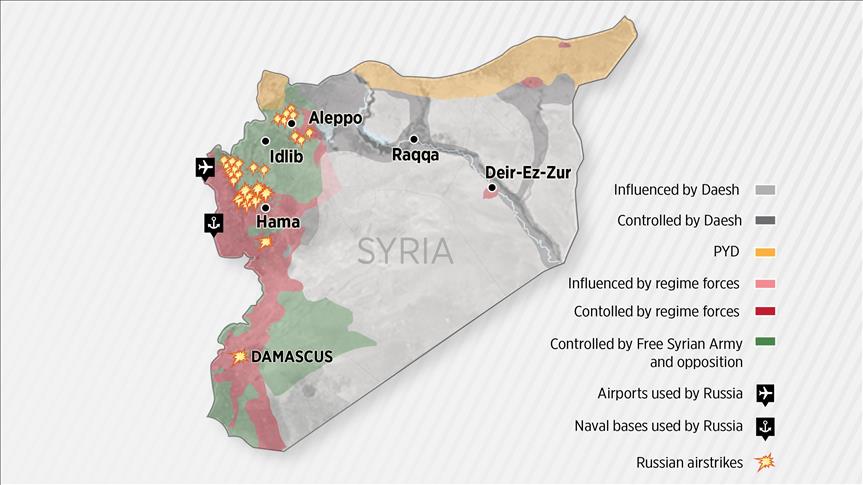UNSC resolution gives Syria’s Assad 2 more years in power
Resolution 2254 calls for regime-opposition talks and ‘political transition’ period to culminate in elections in mid-2017

Ankara
ANKARA
Syrian President Bashar al-Assad appears to have secured at least another two years in power after the UN Security Council (UNSC) adopted a resolution last week calling for regime-opposition talks and a period of "political transition" to last until Syrian elections are held in mid-2017.
Ongoing Russian airstrikes in Syria, meanwhile, continue to claim numerous civilian lives, while a number of Syrian opposition groups demand Assad’s immediate departure from the political stage.
On Friday, the UNSC unanimously adopted Resolution 2254, which calls for "formal negotiations" between the Assad regime and Syrian opposition groups aimed at initiating a "political transition process" to begin no later than January of next year.
These talks – which, according to the resolution, should be accompanied by a nationwide cease-fire -- are intended to yield a transitional government tasked with initiating constitutional reforms before general elections are held in June 2017.
The notion of elections in Syria, however, raises a host of questions -- especially given the fact that large swathes of the country are now controlled by the Daesh militant group, some 4.5 million Syrians have fled the country and about eight million others have been internally displaced.
As it currently stands, therefore, the envisioned vote could only be held in regime-controlled or pro-regime areas of the war-torn country.
What’s more, the UNSC resolution does not specify whether Assad himself would play a role in the called-for "political transition" period.
Russia, meanwhile, the Assad regime’s primary ally, has consistently attempted to weaken the position of the Syrian opposition.
On Dec. 9 and 10, Riyadh hosted a number of moderate Syrian opposition groups, which agreed to establish a team tasked with negotiating with the Assad regime in upcoming talks.
These groups, however, believe Assad and his clique should not play a role in the anticipated transitional stage.
At the same time, the PYD -- the Syrian offshoot of the terrorist PKK organization -- held an alternative meeting attended by a number of so-called opposition groups, including the Change and Salvation Front, the Nationalist Social Syria Party and the National Will Party.
Another question posed by Resolution 2254 is how, under the current circumstances, the called-for cease-fire will be implemented.
Some opposition groups demand guarantees of Assad’s removal before they sign on to a cease-fire. Insisting on such guarantees, however, would potentially open them up to charges that they were hindering the peace process.
Resolution 2254 also calls for the provision of humanitarian assistance in Syria and the creation of a safe environment for the return of Syrian refugees from neighboring countries.
Russian airstrikes
Russia, meanwhile, continues to carry out frequent airstrikes in Syria, resulting in a steadily-mounting civilian death toll.
On Dec. 18, 16 Syrians were killed when Russian warplanes attacked Jasr as-Shugur in Syria’s Idlib province. The following day, another eight people were killed in Russian airstrikes in Aleppo.
And on Dec. 20, Russian warplanes targeted a courthouse in Idlib, leaving 40 civilians dead, while another 13 were killed in a separate attack on northern Aleppo’s Kafr Nabude district.
Turkey's stance
On Saturday, one day after the resolution’s endorsement, Turkish Foreign Minister Mevlut Cavusoglu said peace and stability in Syria were only possible if Assad left the political stage.
Endorsing the UNSC’s newly-adopted "roadmap" for Syria’s political transition, the Turkish Foreign Ministry said Resolution 2254 was in line with the principles laid out in previous framework agreements.
"Achieving peace and stability in Syria will only be possible when a fully authorized transitional government comes to power via free and fair elections and the elements of the [Syrian] regime that played a role in the bloodshed -- especially Bashar al-Assad -- exit the scene," read a Foreign Ministry statement.
"Turkey," the ministry added, "will continue to contribute to the political process [in Syria] within this context."
The Syria conflict, which will enter its sixth year in early 2016, has left more than 250,000 people dead and turned the country into the world's largest source of refugees and displaced people, according to UN figures.
Anadolu Agency website contains only a portion of the news stories offered to subscribers in the AA News Broadcasting System (HAS), and in summarized form. Please contact us for subscription options.







